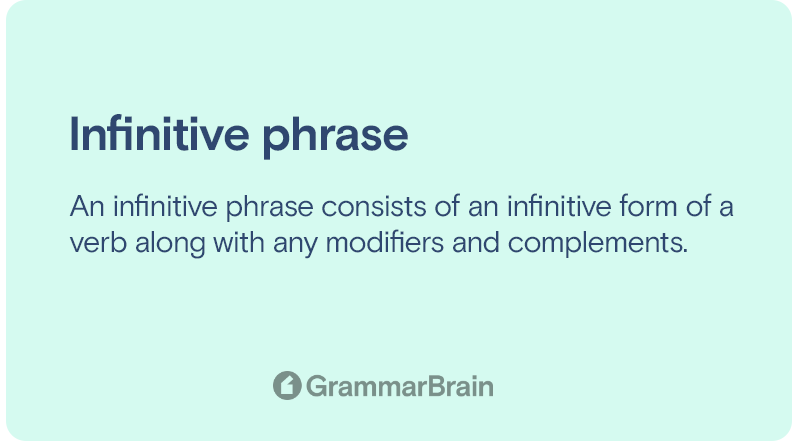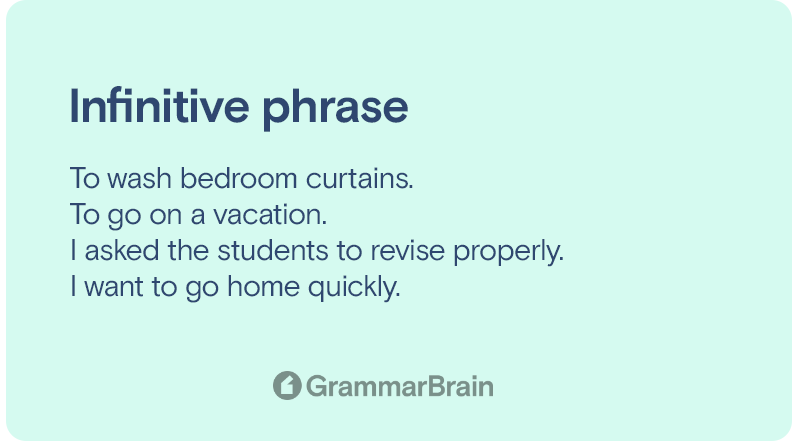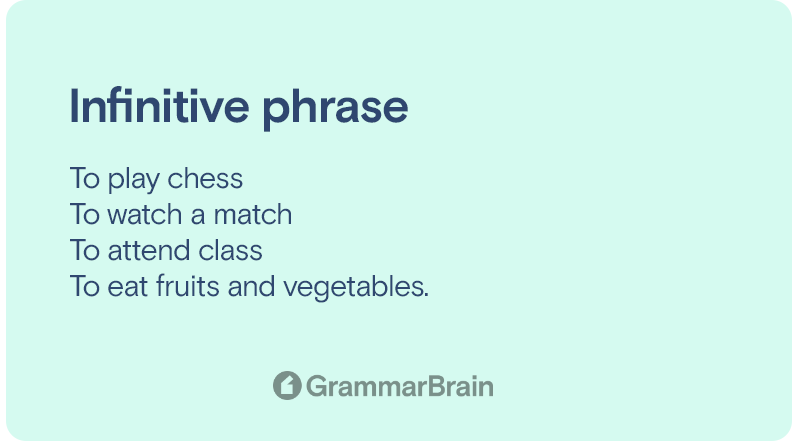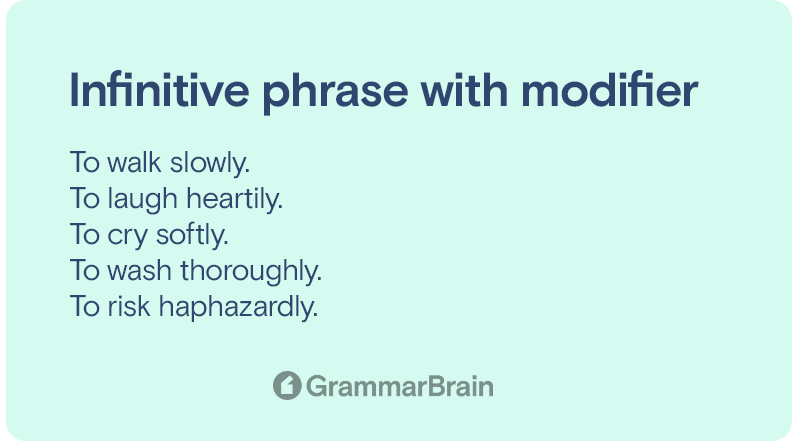What is an infinitive phrase? An infinitive phrase is a group of words that begin with an infinitive. Similar to infinitives, an infinitive phrase can be an adjective, a noun, or an adverb. It all depends on how the part of speech is used in a sentence.
Ready to jump in?

What is an Infinitive Phrase?
An infinitive phrase comprises multiple words. To understand the meaning of an infinitive phrase, you will need to know how those words behave in a sentence.
An infinitive phrase consists of an infinitive form of a verb along with any modifiers and complements.
An infinitive verb is the “to” form of a verb. Any verb expressed as “to sing,” “to jump,” etc., is an infinitive verb.
Modifiers act like adverbs or adjectives as they add more meaning to the thing they describe.
Complements are words or words which complete an expression’s meaning.

For example, read these phrases –
- To wash bedroom curtains.
- To go on a vacation.
- I asked the students to revise properly.
- I want to go home quickly.
All the above phrases are examples of infinite phrases.
Definition
An infinite phrase consists of an infinitive, the use of pronouns or a modifier, indirect objects, direct objects, or complements (of state/action).

Infinitive phrase components
You already know the rough breakdown of an infinitive phrase. Here are more details about the components –
Infinitive – An infinite or infinite verb is the “to” form of the verb. When used in a sentence, an infinite verb does not give any specific duration.
For example –
- He likes to jog
Here, “to job” is an infinitive. We don’t know if he will ever stop jogging.
Now, read this example –
- He wanted to jog today
Here, “to jog” is not an infintive. We know he wanted to jog on a specific day.
Object – Any noun or pronoun which gets the action of a verb in the sentence is called the object of the sentence.
Here are some examples –
- To play chess
- To watch a match
- To attend class
- To eat fruits and vegetables.
In the case of infinitive phrases, the direct object becomes the complement of the phrase.
Here is an example of an object used in an infinitive phrase (in italics) –
- She likes to take notes thoroughly.
The complement in this sentence is “notes,” as it is the direct object of the infinitive verb “to knead.”
Modifiers – Words or phrases which add more meaning to a noun or pronoun. Modifiers can act as an adjective or adverbs in a sentence based on their use.

Modifiers make the words more expressive in a sentence.
Here are some examples –
- To walk slowly.
- To laugh heartily.
- To cry softly.
- To wash thoroughly.
- To risk haphazardly.
When used in an infinite phrase (in italics), a modifier will work like this –
- He wanted to drive home slowly.
In this sentence, the modifier is “slowly” as it tells us how the subject (“he”) wanted to drive his vehicle. The infinitive verb in the sentence is “to drive,” and the complement or object is “home.”
What is an infinitive?
It is important to understand the meaning of infinitive verbs to truly comprehend infinitive phrases.
Infinitive verb = “To” + verb
Examples –
- To run
- To give
- To hold
- To live
- To last
In a sentence, an infinitive verb can play the role of adverb, adjective, subject complement, direct object, or subject.
Noun infinitives
These infinitives function as a noun in a sentence. For examples –
- To dance is to stay healthy.
Adjective infinitives
These infinitives function as an adjective in a sentence. For example –
- He came back to fight the enemies.
Adverb infinitives
These infinitives function as an adverb in a sentence. For example –
Infinitive Phrases Used As Nouns
As mentioned earlier, infinitive phrases can be used as nouns. Based on its use, an infinite phrase can act like a subject, a complement, or a direct object in a sentence.
Examples
Here are some examples where infinitive phrases are used as subjects –
- To give any care takes more effort than not caring at all.
In this sentence, “To give any care” is the infinite verb. It acts as the subject of the verb “takes.”
- To forgive someone is good. To forgive yourself is great.
Here there are two infinitive phrases – “To forgive someone” and “To forgive yourself.” They both act like the subject of the auxiliary verb “is” in the sentence.
- To live life frugally is not everyone’s cup of tea.
The infinitive phrase in this sentence is “To live life frugally.” It is the subject of the verb “is.”
Here are some examples where infinitive phrases are used as objects –
- She found it hard to let him go.
The infinitive phrase in the sentence is “to let him go.” It is the direct object of the verb “found.”
- He assisted to build this building.
The infinite phrase in the sentence is “to build this building.” It is the direct object of the verb “assisted”.
- Nobody likes to attend boring lectures.
The infinite phrase in the sentence is “to attend boring lectures.” It is the direct object of the verb “likes.”
Here are some examples where infinitive phrases are used as complements –
- The only way out was to open the backdoor.
The infinite phrase in the sentence is “to open the backdoor.” It is the complement of the verb “was.”
- Our objective is to help the workers perform better.
The infinite phrase in the sentence is “to help the worker perform better.” It is the complement of the verb “is.”
The infinite phrase in the sentence is “to tell what others should think.” It is the complement of the verb “is.”
Infinitive Phrases Used As Adjectives
Infinitive phrases can also be used as adjectives in a sentence. As an adjective, infinitive phrases describe a noun or pronoun.
Examples
Here are some examples –
- Allow her to show you the best method to wash this material.
The infinite phrase in the sentence is “to wash this material”. It describes the noun “method”.
- He loves fantasy novels. He needs one to read on vacation.
The infinite phrase in this example is “to read on vacation.” It describes the noun “one” which refers to “fantasy novels” in the first sentence.
The infinite phrase in the sentence is “to forgive those who have hurt you.” It describes the noun “willingness.”
Infinitive Phrases Used As Adverbs
Adverbs add more meaning to the verb. It expresses in more detail how the action occurred. Interestingly, an infinitive phrase that acts like an adverb may not start with “to.” It could also start with “in order to.”
Examples
Here are some examples where infinitive phrases act like an adverb in a sentence –
- The men returned to assist the prisoners.
The infinite phrase in the sentence is “to assist the prisoners.” It is modifies the verb “method.” This way, the readers know why the men returned (answer: to help the prisoners).
- She opened the fridge to find a big cake.
The infinite phrase in the sentence is “to find a big cake.” It is modifies the verb “opened.” We know why she opened the fridge (answer: to find a big cake).
- God helps those who try to help themselves.
The infinite phrase in the sentence is “to help themselves.” It modifies the verb “try.”
Bare Infinitives
Not all infinitives are preceded by “to.” Such infinites are called bare infinitives.
Here are some examples – “must,” “might,” “may,” “could,” “can,” “should,” “would,” and “will.”
When paired with infinitive phrases, the sentences read like this –
- You should go home quickly.
The infinite phrase in the sentence is “go home quickly.” The bare infinitive used is “go.”
- They will finish the work by next week.
The infinite phrase in the sentence is “finish the work by next week.” The bare infinitive used is “finish”.
- Ruth helps Jamie cook his father a meal.
The infinite phrase in the sentence is “cook his father a meal.” The bare infinitive used is “cook.”
- After half-time, a rested player can sweep the floor promptly with his scores.
The infinite phrase in the sentence is “sweep the floor promptly.” The bare infinitive used is “sweep.”
Sentences with an Infinitive Phrase Acting as the Subject
Here are some examples where infinitive phrases act as the subject of a sentence –
- To score high marks is every student’s dream.
- To rank higher than experts is a sign of genius.
- To break the rules takes a lot of courage.
- To hope for peace is like hoping for food to appear on the plate.
How to use Infinitive Phrases
As discussed earlier in the article, you can use infinitive phrases in many ways.
Depending on the sentence, an infinitive phrase can act as an adjective, a noun, or an adverb.
How to Identify Infinitive Phrases
The easiest way to spot an infinitive phrase is to look for the pattern –
Infinitive verb + complement + modifier.
For example – “to wake up from bed slowly” is an infinitive phrase. The infinitive verb is “to wake,” the complement is “bed,” and the modifier is “slowly.”
FAQs
How do you know if a phrase is infinitive?
If the phrase meets the pattern of infinitive + complement + modifier, then it is an infinitive.
Do all infinitives begin with “to”?
No, some infinitives do not begin with “to.” They are called bare infinitives.
When should you not use “to” in infinitives?
You don’t need to add “to” if the infinitive is formed from a proper noun.
What is the infinitive phrase function?
When an infinitive phrase functions an adjective, it describes a noun or a pronoun.
Is a infinitive phrase and a prepositional phrase the same?
No. A verbal consisting of to plus a verb—prepositional phrases beginning with to, which consists of to plus a noun or pronoun and any modifiers.
Inside this article
Fact checked:
Content is rigorously reviewed by a team of qualified and experienced fact checkers. Fact checkers review articles for factual accuracy, relevance, and timeliness. Learn more.
Core lessons
Glossary
- Abstract Noun
- Accusative Case
- Anecdote
- Antonym
- Active Sentence
- Adverb
- Adjective
- Allegory
- Alliteration
- Adjective Clause
- Adjective Phrase
- Ampersand
- Anastrophe
- Adverbial Clause
- Appositive Phrase
- Clause
- Compound Adjective
- Complex Sentence
- Compound Words
- Compound Predicate
- Common Noun
- Comparative Adjective
- Comparative and Superlative
- Compound Noun
- Compound Subject
- Compound Sentence
- Copular Verb
- Collective Noun
- Colloquialism
- Conciseness
- Consonance
- Conditional
- Concrete Noun
- Conjunction
- Conjugation
- Conditional Sentence
- Comma Splice
- Correlative Conjunction
- Coordinating Conjunction
- Coordinate Adjective
- Cumulative Adjective
- Dative Case
- Determiner
- Declarative Sentence
- Declarative Statement
- Direct Object Pronoun
- Direct Object
- Diction
- Diphthong
- Dangling Modifier
- Demonstrative Pronoun
- Demonstrative Adjective
- Direct Characterization
- Definite Article
- Doublespeak
- False Dilemma Fallacy
- Future Perfect Progressive
- Future Simple
- Future Perfect Continuous
- Future Perfect
- First Conditional
- Irregular Adjective
- Irregular Verb
- Imperative Sentence
- Indefinite Article
- Intransitive Verb
- Introductory Phrase
- Indefinite Pronoun
- Indirect Characterization
- Interrogative Sentence
- Intensive Pronoun
- Inanimate Object
- Indefinite Tense
- Infinitive Phrase
- Interjection
- Intensifier
- Infinitive
- Indicative Mood
- Participle
- Parallelism
- Prepositional Phrase
- Past Simple Tense
- Past Continuous Tense
- Past Perfect Tense
- Past Progressive Tense
- Present Simple Tense
- Present Perfect Tense
- Personal Pronoun
- Personification
- Persuasive Writing
- Parallel Structure
- Phrasal Verb
- Predicate Adjective
- Predicate Nominative
- Phonetic Language
- Plural Noun
- Punctuation
- Punctuation Marks
- Preposition
- Preposition of Place
- Parts of Speech
- Possessive Adjective
- Possessive Determiner
- Possessive Case
- Possessive Noun
- Proper Adjective
- Proper Noun
- Present Participle
- Prefix
- Predicate



